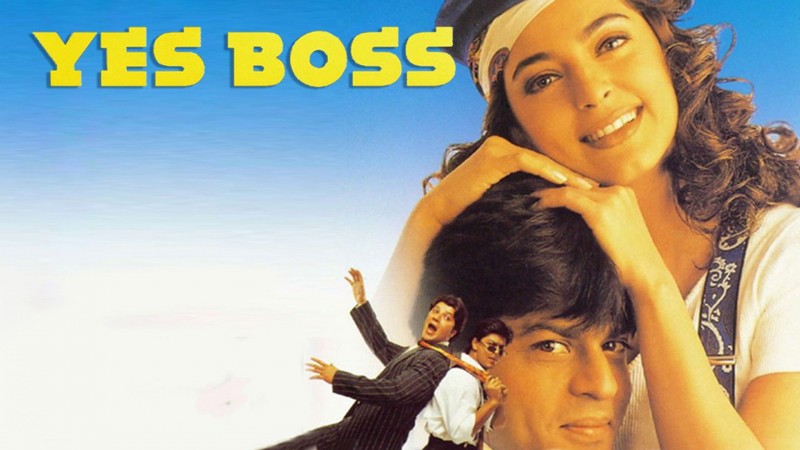
Bollywood, the term for the Indian film industry, has a long history of creating enjoyable and iconic films that have won the hearts of millions of people all over the world. "Yes Boss" is one such movie that stands out in Bollywood's vast filmography. Many people might not be aware, though, that the title of this comedy-drama wasn't always "Yes Boss." The movie's original working title was "Mohabbat Isko Kehte Hain." The fascinating journey of how this movie changed from its original title to become a cherished Bollywood classic is explored in this article.
In order to comprehend how "Mohabbat Isko Kehte Hain" became "Yes Boss," we must first examine the origins and original idea of the movie. Aziz Mirza was the film's director, and it came out in 1997. Shah Rukh Khan and Juhi Chawla, two of Bollywood's most well-known actors, played the lead roles. Rahul Joshi, played by Shah Rukh Khan, is a driven young man who works at a company run by Siddharth, played by Aditya Pancholi. Rahul's life is the focus of the movie.
The film's initial title, "Mohabbat Isko Kehte Hain," translates to "This Is Called Love" in English. This title alluded to the main theme of the movie, which was love and its complexities in the contemporary corporate world. Rahul, who is portrayed by Juhi Chawla, develops feelings for Seema, the secretary of his boss. He is, however, torn between his loyalty to Siddharth and his love for Seema, who he also feels for. The central conflict of the movie's story is this love triangle.
The choice to change the title was not random, despite the fact that "Mohabbat Isko Kehte Hain" was a sombre and reflective one. Bollywood frequently accords a great deal of significance to movie names because they are an essential component of marketing and audience involvement. So why did the movie's rename become "Yes Boss" at the last minute?
Commercial Appeal: The desire to appeal to a wider audience was one of the main drivers behind the title change. In addition to being more catchy, "Yes Boss" also exudes a sense of humour and levity that fits with the comedy in the movie. This new title was more likely to catch the public's attention.
Clarity: "Yes Boss" captures the crux of the movie's conflict in a single sentence. Rahul frequently uses the catchphrase "Yes Boss" in an effort to win Siddharth over, highlighting the power dynamics between them. As a memorable aspect of the movie, this phrase rose to fame as an iconic catchphrase.
Marketability: Because of the corporate setting of the movie and the word "Boss" in the title, the working population could immediately identify with it. This significantly influenced the marketing plan for the movie and boosted its box office performance.
Global Appeal: As Bollywood started to gain international recognition in the late 1990s, a title like "Yes Boss" had the potential to be more widely understood and appreciated, making it suitable for international releases.
Following its release, "Yes Boss" proved to be a commercial success, enjoying success both at home and abroad. Along with its captivating plot and standout performances by Shah Rukh Khan and Juhi Chawla, the movie's catchy title contributed to its appeal to viewers of all ages. The soundtrack to the film, which was written by Jatin-Lalit, also rose to enormous popularity and added to its allure.
Shah Rukh Khan and Juhi Chawla's on-screen chemistry was a major draw for viewers because the two had previously collaborated in a number of well-received films. In "Yes Boss," their endearing performances and lighthearted banter gave their characters depth and made the love story relatable.
Humorous Comedy: "Yes Boss" provided a welcome fusion of comedy and romance. The movie's humour was subdued and situational, which made it easy for viewers to relate to the characters' struggles and laugh with them.
The soundtrack of the movie, which included songs like "Chaand Taare" and "Ek Din Aap Yun Humko Mil Jayenge," became chart-toppers and greatly boosted the movie's popularity. In addition to supporting the story, the music captured audiences' attention and lingered there for years.
Strong Direction: Aziz Mirza's direction was crucial in determining the success of the movie. He skillfully struck a balance between the comedy and the film's more serious moments, keeping the audience interested throughout.
"Yes Boss" is a perfect illustration of how a movie can change, not just in terms of title but also in terms of appeal as a whole, to become a cherished classic in Bollywood's wide-ranging canon. While "Mohabbat Isko Kehte Hain" may have encapsulated the film's theme in its entirety, "Yes Boss" did so in a more marketable and approachable way. The journey of the movie from its initial title to its ultimate success is a testament to the innovative judgement and marketing know-how that drive the Bollywood industry. Fans still adore "Yes Boss" today, reminding us that a great movie is about more than just its title but also the magic it creates on the big screen.
The Journey of 'Mahadev Ka Sajjanpur' to 'Welcome to Sajjanpur'
Subhash Ghai's Trilogy Explores NRI Identity
Mausam (2011), A Cinematic Odyssey Through the Changing Seasons of Emotion